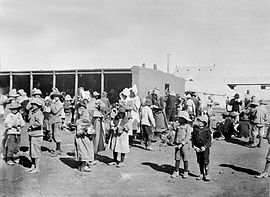
Back Penginterniran BEW Internace Czech Internering Danish Internierung German Internamiento Spanish توقیف Persian Internointi Finnish Internement French כליאה המונית HE Internálás Hungarian

| Part of a series on |
| Discrimination |
|---|
 |
Internment is the imprisonment of people, commonly in large groups, without charges[1] or intent to file charges.[2] The term is especially used for the confinement "of enemy citizens in wartime or of terrorism suspects".[3] Thus, while it can simply mean imprisonment, it tends to refer to preventive confinement rather than confinement after having been convicted of some crime. Use of these terms is subject to debate and political sensitivities.[4] The word internment is also occasionally used to describe a neutral country's practice of detaining belligerent armed forces and equipment on its territory during times of war, under the Hague Convention of 1907.[5]
Interned persons may be held in prisons or in facilities known as internment camps, some of which are known as concentration camps. The term concentration camp originates from the Spanish–Cuban Ten Years' War when Spanish forces detained Cuban civilians in camps in order to more easily combat guerrilla forces. Over the following decades the British during the Second Boer War and the Americans during the Philippine–American War also used concentration camps.
The terms concentration camp and internment camp are used to refer to a variety of systems that greatly differ in their severity, mortality rate, and architecture; their defining characteristic is that inmates are held outside the rule of law.[6] Extermination camps or death camps, whose primary purpose is killing, are also imprecisely referred to as concentration camps.[7]
The Universal Declaration of Human Rights restricts the use of internment, with Article 9 stating, "No one shall be subjected to arbitrary arrest, detention or exile."[8]
- ^ Lowry, David (1976). "Human Rights Vol. 5, No. 3 "INTERNMENT: DENTENTION WITHOUT TRIAL IN NORTHERN IRELAND"". Human Rights. 5 (3). American Bar Association: ABA Publishing: 261–331. JSTOR 27879033.
The essence of internment lies in incarceration without charge or trial.
- ^ Kenney, Padraic (2017). Dance in Chains: Political Imprisonment in the Modern World. Oxford University Press. p. 47. ISBN 978-0-19-937574-5.
A formal arrest usually comes with a charge, but many regimes employed internment (that is, detention without intent to file charges
- ^ "the definition of internment". www.dictionary.com.
- ^ Schumacher-Matos, Edward; Grisham, Lori (10 February 2012). "Euphemisms, Concentration Camps And The Japanese Internment". npr.org.
- ^ "The Second Hague Convention, 1907". Yale.edu. Archived from the original on 19 October 2012. Retrieved 1 February 2013.
- ^ Stone, Dan (2015). Concentration Camps: A Very Short Introduction. Oxford University Press. pp. 122–123. ISBN 978-0-19-879070-9.
Concentration camps throughout the twentieth and twenty-first centuries are by no means all the same, with respect either to the degree of violence that characterizes them or the extent to which their inmates are abandoned by the authorities... The crucial characteristic of a concentration camp is not whether it has barbed wire, fences, or watchtowers; it is, rather, the gathering of civilians, defined by a regime as de facto 'enemies', in order to hold them against their will without charge in a place where the rule of law has been suspended.
- ^ "Nazi Camps". United States Holocaust Memorial Museum. Retrieved 3 October 2020.
- ^ Universal Declaration of Human Rights, Article 9, United Nations